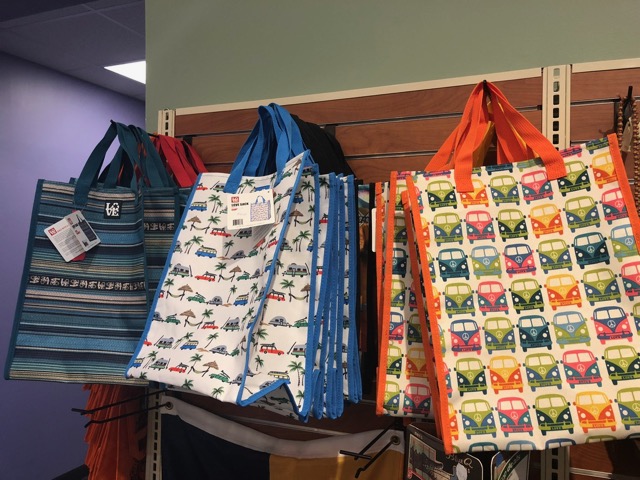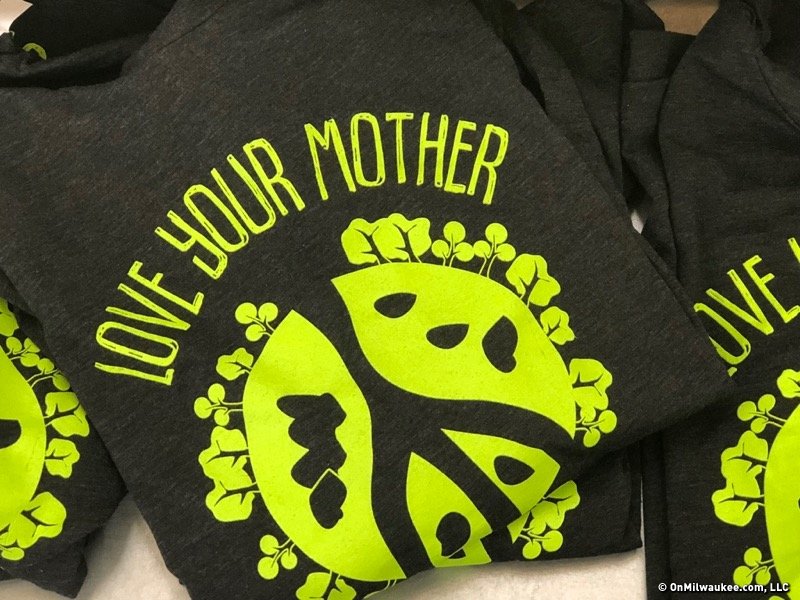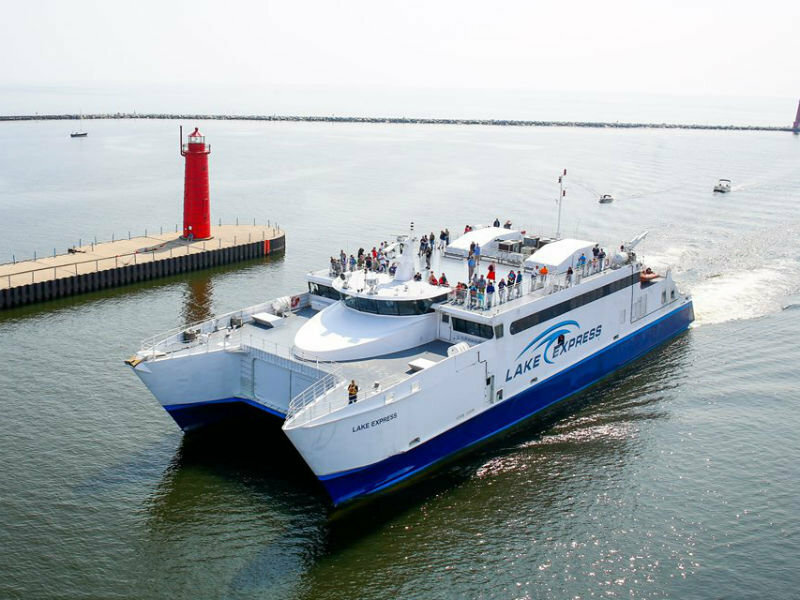Much has changed since 1970, the year when Wisconsin Senator Gaylord Nelson rallied the nation against environmental destruction.
"Americans were slurping leaded gas through massive V8 sedans," reads the Earth Day website. "Industry belched out smoke and sludge with little fear of legal consequences or bad press. Air pollution was commonly accepted as the smell of prosperity. 'Environment' was a word that appeared more often in spelling bees than on the evening news."
Since that time, we’ve seen a variety of businesses "go green." An increasing number of restaurants are making efforts to buy locally and reduce waste through measures like composting. And they're not alone. Corporations and retailers across the globe are finding new, innovative ways to decrease their impact on the environment.
But consumer behaviors have at least as much – if not more – impact on the environment.
One of the local businesses that is making huge strides toward sustainability is Outpost Natural Foods Cooperative, a cooperatively owned grocery store which has been on the EPA Green Power Partnership Top 30 Retailer list for five years running, and which publishes an annual sustainability report that charts its progress.
"We’re just one business working toward doing the right thing," says Margaret Mittelstatdt, Outpost’s director of community relations. "And we’re never going to be perfect. But we try to cast a broad net, set a good example and make it easy for consumers to make good choices in their own lives.
"So many of the things we do are simple things that people can also do in their own homes. It just takes a bit of thought and a little effort ... If a grocery store can do it, so can you."
1. BYO shopping and produce bags

One of the easiest things you can do is to start bringing your own bags to the store when you shop (at the grocery store or otherwise).
"At Outpost, we eliminated plastic shopping bags in 2005," says Mittelstadt. "People have been bringing their own bags here for years, so the transition was fairly easy. We’ve created a culture here that naturally supports it. We do still offer paper grocery bags at the checkout. They're certified by the Sustainable Forestry Initiative, which means that the trees harvested for bag production are grown using sustainable forestry practices and are composed of up to 40 percent post-consumer waste."
Mittelstadt says the grocer has also switched over to recyclable plastic bags in their produce department. For those who’d prefer to avoid them, they sell reuseable, washable mesh bags and muslin bags (including some made for carrying breads like fresh baguettes!) that customers can purchase and bring to the store when they shop.
"We want to give people the opportunity to make better choices," says Mittelstadt, noting that the Bay View Outpost is also launching a "boomerang bag" initiative which allows people to borrow handmade reusable bags from the store and return them on their next shopping trip.
Pro tip: Do you keep forgetting your shopping bags? Keep a bag or two in your car so you’ll never be without one.
2. Eliminate water bottles and disposable cups

This is a good example of how little things make a big difference. Do you drink bottled water on a daily basis? Do you drink coffee out of disposable paper (or Styrofoam) cups? Changing these two little habits can make a world of difference when you consider the impact over days, weeks and months.
Drinking coffee at the office? Keep a ceramic mug at your desk. It’s easy enough to wash or rinse out each day, and it will save a ton of paper. The same goes when you drink coffee or tea at a cafe. Ask for a mug or a pint glass! The barista will be happy to oblige. They’re also happy to fill your reusable insulated coffee mug if you have it on hand.
Mittelstadt notes that Outpost sells any number of types of reusable bottles from stainless steel and glass water bottles to insulated mugs. They also sell covers that can be used to retrofit a multi-purpose Ball canning jar into a drinking vessel.
If you drink something often, it also makes sense to purchase it in larger containers. For instance, Outpost offers taps of kombucha (along with reusable growlers) at their cafes, so you can avoid buying individual bottles. The same goes for water; they have a reverse osmosis water kiosk where you can refill water bottles for just 15 cents (and larger containers for similarly affordable prices).
3. Replace regular light bulbs with LEDs

"At our Mequon store, we have solar panels, and the energy they generate in a year is enough to power six average homes. It’s probably 10 percent of our energy usage, overall. That’s one way we’re looking at reducing our energy consumption. The other is replacing regular or fluorescent bulbs with LEDs. From that effort alone, we've seen significant cost savings in our stores. It's also something easy that anyone can do."
Fact: LEDs are up to 80 percent more efficient than traditional lighting options. That's because 95 percent of the energy in LEDs is converted into light, with only 5% wasted as heat. They also use much less power, which reduces the demand on power plants and decreases the accompanying greenhouse gas emissions. Their long life is an added bonus, making their cost pay off easily in the long run.
If you own a home or business and would like to consider solar panels, you might be interested to know there's a discount is available from Sunvest through the Outpost Natural Foods Cooperative group buying program.
4. Think before you use a straw

It’s a little thing, that small plastic straw. But it has a huge impact on the environment, from the waste it creates to the danger it poses to wildlife.
In the U.S. alone, we use over 500 million straws every day – enough to circle around the Earth 2.5 times. Add the fact that it can take up to 200 years for one single plastic straw to decompose … you see where we’re going with this.
Area restaurants like La Merenda and Engine Company No. 3 stopped using straws over a year ago. Cafe Lulu in Bay View has also followed suit. And big corporate restaurants like McDonald’s might be next, particularly if their efforts to convert to paper straws in the UK are successful.
Outpost has not banned straws. Instead, it's begun using straws made by a company called Worldcentric, says Mittelstadt. The straws are compostable if sent to a commercial facility. It also sells reusable stainless steel straws which can be washed and used virtually forever.
Wish there was an easier way to give up straws? You might be interested in supporting this clever Kickstarter campaign for a new portable reusable straw that comes a carrying case small enough to fit on your key chain.
5. Eschew plastic wrap and sandwich bags

OK, so you're cutting back on using straws. Want to go a bit further? Try giving up single use plastic wrap or sandwich bags.
Outpost carries a number of products that can help, including recyclable paper sandwich bags and a variety of alternatives to plastic wrap.
"The beeswax wraps are really nice," notes Mittelstadt. "They’re essentially wax infused fabric. The heat of your skin actually softens the wax, and then you can mold it around a food product, like cheese, or a bowl. It can be wiped with a soapy sponge, rinse it and let it dry. Eventually, when the wax breaks down and you can compost it."
6. Compost!

If you have a yard, consider starting a compost pile (you can buy a bin or take a class from Keep Greater Milwaukee Beautiful). If don’t, consider supporting places that do (including many restaurants and businesses, including Potawatomi Hotel & Casino).
"Since starting our composting program in 2013, we’ve composted 752 tons of food waste (the equivalent of 19 full garbage trucks)," says Mittelstadt. "And we’re just one small business. Our fresh departments work in conjunction with our food service program to mitigate losses. Any food scraps from Outpost stores and its commercial kitchen are collected by Compost Crusaders or Sanimax and taken to Blue Ribbon Organics in Caledonia where they are It then comes back to us in the form of Blue Ribbon compost, which we sell to our customers to use in their gardens. It’s 100 percent full circle."
.jpg)
There are also ways that customers can contribute to this effort. All Outpost Cafes also feature waste bins where you can sort your waste into three areas: compost, recycling and landfill. If the differentiation between the bins is a bit mysterious, here’s a brief summary of what can go into each.
- Compost: Leftover food items are the obvious choice for composting. But you can also compost Outpost’s plastic straws and straw papers, receipts, paper cups, bowls and food service boats, napkins and paper towels.
- Recycling: These bins are appropriate for #1-7 plastic, aluminum, cardboard and glass items.
- Landfill: Garbage bins are reserved for the few items that are left including non-recyclable food wrappers, utensils and aseptic boxes (juice boxes, etc.)
7. Buy locally grown and made products

Where does it come from? How far has it traveled? Just asking those questions is a good start to thinking about the impact the food we eat (and even the beer we drink) has on the environment.
"When you buy from a local vendor, you’re contributing to the local and rural economy," says Mittelstadt. "That creates jobs, contributes towards the tax base and creates meaningful work and a viable living for someone. Preserving the cultural and collective wisdom of small family farms is so important, especially when you consider how much the farming landscape has changed over the years. We also feel that food tastes best when it comes from somewhere close to home. It’s harvested at peak ripeness, so you get the best flavor and nutritional profile. There’s also so much variety. Local growers can grow things that others can’t, like heirloom vegetables, which often don’t hold up well to cross-country transport.
"At Outpost, our relationship and commitment to local and regional farmers and producers has contributed $104 million to the local and regional economy in the last five years. That’s a whopping 32 percent of our sales and 80 percent of those products come from within 100 miles, which means there’s a reduction in transportation costs."
8. Buy in bulk

Folks think that buying in bulk means buying a lot of something. But that’s not true. In fact, purchasing items like flour, pasta, spices and nuts from bulk bins can actually save you time and money while doing a lot to reduce food and packaging waste.
"You can buy exactly what you need, whether it be a few tablespoons of a spice or a cup of red rice," notes Mittelstadt. "You can go one step further and avoid the plastic bags by using the muslin bags that we sell. They can be filled, washed and reused hundreds of time."
9. When you buy products, pay attention to the packaging
When you bring home a frozen pizza, what do you do with the cardboard? Do you recycle it? People sometimes don’t think about the little things they can do to reduce waste. Even if a product is produced sustainably, consumers are part of the chain. And without consumers as the connecting link, the whole chain falls apart. There’s a big difference that can be made just by paying attention to the packaging. Look for containers, like glass jars, that can be reused and then use them. Recycle whenever possible.
10. Take one baby step, then another
"Challenge yourself to make little changes," says Mittelstadt. "Challenge your kids to do the same. And when you see things that could make a difference at a grocer, restaurant or retailer, point them out. The collective impact is so much greater when we all contribute."
Read more on sustainability in Milwaukee restaurants:
A bunch of garbage: How restaurants deal with waste
Balzac family meal tackles food waste
Sustainable seafood presents opportunities, challenges for area restaurants
Two local joints nix straws
As a passionate champion of the local dining scene, Lori has reimagined the restaurant critic's role into that of a trusted dining concierge, guiding food lovers to delightful culinary discoveries and memorable experiences.
Lori is an avid cook whose accrual of condiments and spices is rivaled only by her cookbook collection. Her passion for the culinary industry was birthed while balancing A&W root beer mugs as a teenage carhop, fed by insatiable curiosity and fueled by the people whose stories entwine with every dish. Lori is the author of two books: the "Wisconsin Field to Fork" cookbook and "Milwaukee Food". Her work has garnered journalism awards from entities including the Milwaukee Press Club. In 2024, Lori was honored with a "Top 20 Women in Hospitality to Watch" award by the Wisconsin Restaurant Association.
When she’s not eating, photographing food, writing or planning for TV and radio spots, you’ll find Lori seeking out adventures with her husband Paul, traveling, cooking, reading, learning, snuggling with her cats and looking for ways to make a difference.







